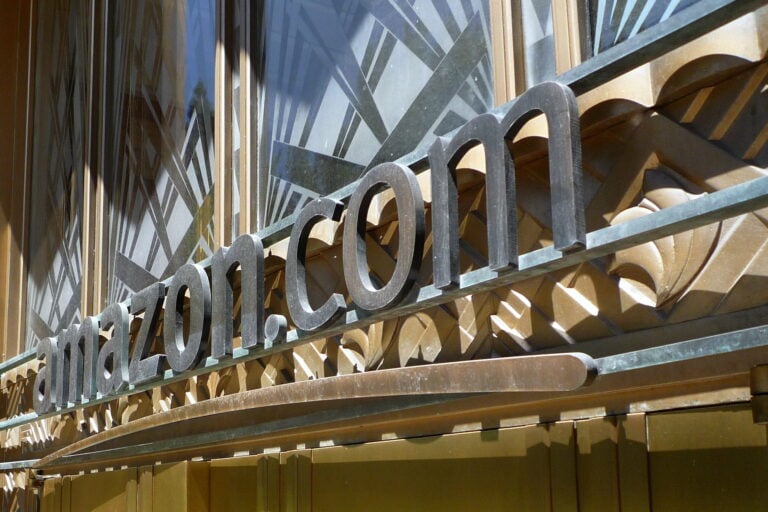
Amazon’s chokehold over online shopping in the EU and UK
Amazon has taken over Europe. After a 20-year-long expansion, supercharged during Covid-19, the US giant is now by far the dominant e-commerce company in Germany, the UK, France, Italy and Spain. In these countries, Amazon is the main port of call for online shoppers. That has made the company nearly unavoidable for independent sellers that wish to sell their products online. This gives Amazon immense power to set abusive terms and extract ever-increasing fees from sellers.
In spite of Amazon’s reach in Europe, its business model is not always well understood. Starting as an online book retailer, it first expanded the types of products it resold, then opened up its website to independent businesses to sell their products. The next step was to provide these sellers with extra services, including logistics and advertising. At the same time, Amazon started making and selling its own products.
In this process, Amazon accumulated different – and conflicting – roles: Amazon as the marketplace intermediary, setting the rules for the market and monitoring all activity within it; as seller, in competition with the independent sellers on the platform; and as service provider to those sellers. As Amazon accumulated data and insights from products searched for and sold through its platform, and gained financial scale,1it built interlocking business lines that reinforce each other. Founder Jeff Bezos spoke of a “flywheel” with various nodes: boost any node, and you boost them all. The more sellers are on Amazon, the more products it has to draw buyers, the more buyers and sellers flock to it.
The strategy has scaled in Europe as Amazon has become the biggest online retailer. In the European Union (EU) alone, there are now 800,000 sellers active in Amazon’s marketplaces. Amazon has been eager to portray itself as a supporter of European small and medium enterprises (SMEs). A top Amazon official in Europe recently claimed that SMEs and Amazon are “stronger together”. But a growing number of competition investigations probing Amazon’s potential abuses of its power towards sellers tell a different story. As a British seller told SOMO:
“Amazon is no friend of the small business.”

Locked in
Sellers are locked into the platform. This, in turn, has allowed Amazon to get away with extracting monopoly rent from them, pushing them into acquiring extra services, and continuously increasing the fees it charges them. By tracing Amazon’s complex structure in Europe, studying service prices over the years, and analysing the findings from competition investigations, SOMO can now show that:
- Amazon’s income from sellers’ fees has tripled in the past five years.
- Amazon’s advertising revenue in Europe has exploded since 2017
- Amazon’s cut of sellers’ income is increasing
- Charges extracted from sellers grow faster than Amazon’s own sales
- Amazon sellers are locked in and vulnerable to abuses
- Amazon’s monopoly power is a structural problem that needs a structural solution
Under investigation
Amazon’s squeezing of sellers is a crucial pillar of its European business, as revenue from independent sellers’ fees is growing faster than its core business, its European retail arm. Altogether, in 2021, Amazon’s revenue from sellers in Europe amounted to € 24.95 billion. The European business is so large that, should Amazon spin off its European marketplace into a separate company, the new firm would immediately become Europe’s third largest tech company by revenue.
Competition investigations in Italy and across the EU have exposed how the company has used its power over sellers to push them into buying logistics services in order to be visible to buyers, and using confidential seller data to compete against them. A similar investigation is underway in the UK. In Germany, the competition authority is investigating whether Amazon is influencing sellers’ pricing with its policies and automated tools. Amazon’s Fair Pricing Policy seems to be in particular contention as Amazon monitors product prices on and off the website and will then demote or even block a product if it finds lower prices elsewhere.
While Amazon argues that this is meant to protect shoppers, it could instead just be protecting Amazon’s “price perception”, isolating itself from price competition while invisibly increasing prices across the economy.
Break up monopoly power
Sellers who spoke with SOMO say they have to be on the platform, no matter how Amazon treats them. That is power. So far, competition probes in Europe have looked at each behaviour in isolation and have either imposed fines or ordered the company to stop a specific practice. None have addressed the company structurally, to tackle the conflicts of interest that lie at the root of its power and wealth. It is time that competition authorities and policymakers adopt a structural response and, once and for all, break up Amazon’s monopoly power.
Are you a seller or a vendor on Amazon? We need your help.
We would like to hear about your experience using the platform and collect more data on Amazon’s treatment of sellers. Get in touch with us privately and securely via Publeaks or encrypted email at margaridarsilva@protonmail.com
Do you need more information?
-

Margarida Silva
Researcher
Partners
-
Balanced Economy Project
Related content
-
Amazon’s European chokehold Published on:
 Margarida SilvaPosted in category:Publication
Margarida SilvaPosted in category:Publication Margarida Silva
Margarida Silva
-

-
The EU should not give in to Amazon’s weak commitments, civil society organisations sayPosted in category:Opinion
 Margarida SilvaPublished on:
Margarida SilvaPublished on: Margarida Silva
Margarida Silva -
The financialisation of Big Tech Published on:
 Rodrigo FernandezPosted in category:Publication
Rodrigo FernandezPosted in category:Publication Rodrigo Fernandez
Rodrigo Fernandez
-
 Big Pharma raked in USD 90 billion in profits with COVID-19 vaccinesPosted in category:News
Big Pharma raked in USD 90 billion in profits with COVID-19 vaccinesPosted in category:News Esther de HaanPublished on:
Esther de HaanPublished on: -
How Big Tech is becoming the GovernmentPosted in category:Opinion
 Rodrigo FernandezPublished on:
Rodrigo FernandezPublished on: Rodrigo Fernandez
Rodrigo Fernandez

